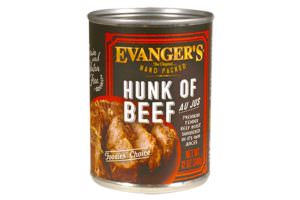Evanger’s Dog & Cat Food voluntarily recalled several lots of their canned Hunk of Beef dog food back in February, but a recent lawsuit is bringing up more questions than answers. In January, one dog died and three others were sickened after being fed the Hunk of Beef product as a special New Year’s treat. After extensive testing, it was determined that the food contained horse meat laced with pentobarbital, a drug commonly used to euthanize animals. Evanger’s paid the affected animal’s vet bills and recalled potentially contaminated products, but they’ve released little information about the situation.
In February, Evanger’s pointed the finger toward their meat supplier. They released an online statement saying, “The guilty party has turned out to be one of our trusted meat suppliers. A USDA-APHIS inspected supplier who we had done business with for over 40 years, and whose plant we had visited numerous times over the years.” They’ve reportedly terminated the working relationship but neglected to identify the supplier right away.

Evanger’s puts the blame on their supplier, but recent evidence is affecting the credibility of their statement. The pet food company has long since advertised their products as being made from “completely human-grade” and “USDA approved” meat, but an FDA announcement on February 17 proved this to be a lie. In a press release, the FDA described a bill of lading sent to Evanger’s from the supplier in question. Evanger’s purchased over $15,000 of “inedible hand deboned beef.”
The description went on to say that the meat was “not fit for human consumption” and “meant for pet food use only.” It was also determined that the supplier “does not have a grant of inspection from the United States Department of Agriculture’s Food Safety and Inspection Service.” This revelation is in direct contrast to everything Evanger’s has previously announced about the situation, and their statement saying the supplier was USDA inspected has since been removed from their website.
First and foremost, we are pet parents. We issued our first recall in 82 years, and created this video to answer… https://t.co/2n2CTduqYC
— Evanger’s Pet Foods (@Evangers) February 8, 2017
Information about the meat supplier slowly leaked via anonymous online sources, but it wasn’t until recently that the name of the supplier was officially unearthed. On April 27, Evanger’s announced a $20 million lawsuit against Bailey Farms LLC, claiming the company sold them an order of beef mixed with contaminated horse meat.
The lawsuit details how Evanger’s bought 21 tons of “inedible hand deboned beef” in November 2015 and then again in May 2016. Court documents state the meat was then used to make Evanger’s “best selling product,” Hunk of Beef canned dog food. According to Evanger’s, the meat in question contained contaminated horse meat that killed one dog and sickened three others. They claim the meat was mislabeled and that Bailey Farms provided an expired Animal Plant Health Inspection Service number.
This isn’t the first controversy for Bailey Farms. In 2014, the animal rendering facility was made to pay over $27,000 in fines and fees after 14 separate charges were brought to court. Among the charges, the company was accused of illegally dumping animal waste material and failing to provide required permits.
The Courier, the Wisconsin news source that originally reported on the controversy, describes Bailey Farms as a “facility processing dead livestock into materials sold to pet food manufacturers.” The Truth About Pet Food takes those accusations a step further and calls the company a “dead animal carcass processor.” They claim the company takes dead animals from farms and processes the meat for use in pet food.
The validity to these claims is yet to be determined, but it would be an explanation as to how the pentobarbital horse meat made it into Evanger’s canned food. Recently unearthed facts show Evanger’s has a legitimate case against Bailey Farms, but many questions have yet to be answered.
Will Evanger’s face legal repercussions for falsely advertising their products as USDA approved? How did the contaminated horse meat make it into the pet food when there are strict laws against it? The upcoming court case will hopefully provide answers.
